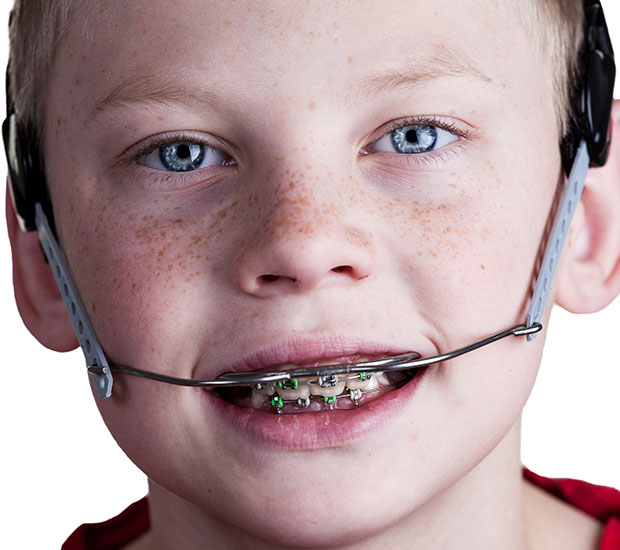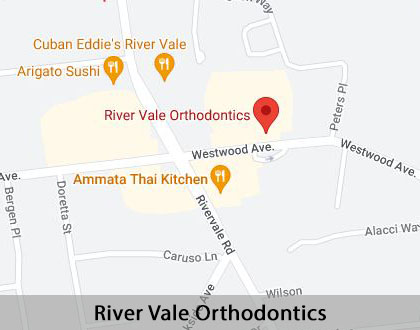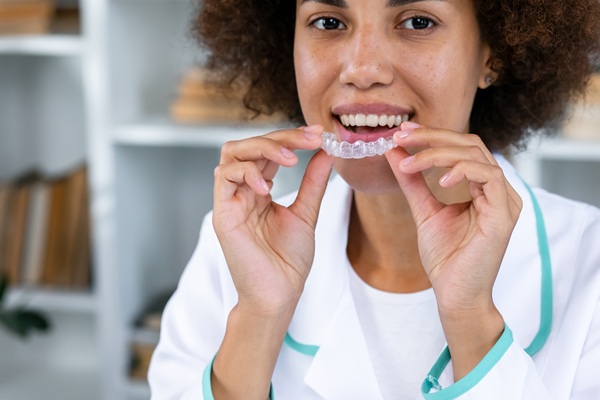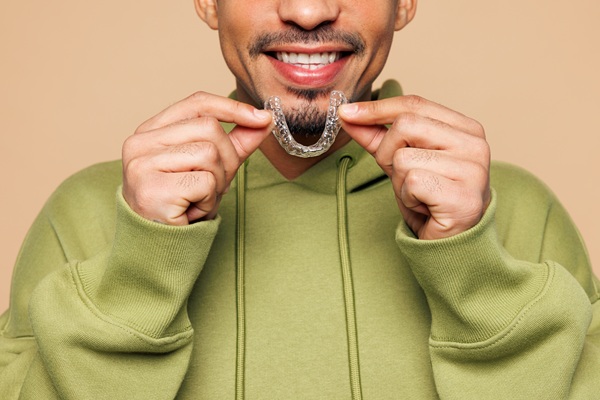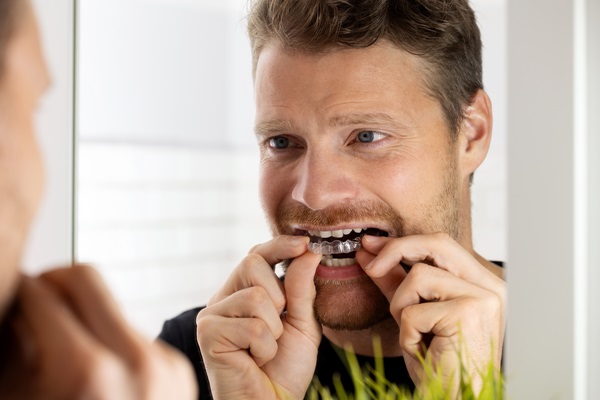Orthodontic Headgear River Vale, NJ
Orthodontic headgear can help correct severe malocclusion. Many patients are surprised to learn that there are several types of orthodontic headgear. Orthodontic headgear is especially beneficial for patients whose jawbones are still developing.
Orthodontic headgear is available at River Vale Orthodontics in River Vale and the surrounding area. Our team will take all the necessary steps to improve your child’s bite and jaw alignment. Call us today at (201) 613-1100 to schedule an appointment or learn more about our services.
Understanding Orthodontic Headgear
Headgear consists of several parts, all of which vary depending on the type of headgear and the condition. The main parts, however, include:
- Head cap
- Braces
- Chin cup, forehead pad, and mouth yoke
- Elastic bands, tubes, and hooks
- Facebow
- Fitting straps
The main types of headgear are cervical pull, high pull, and reverse pull (facemask). Cervical pulls correct overjets, a condition in which the top jaw and front teeth protrude, producing what is colloquially known as buck teeth. High pulls correct overjets or overbites, while reverse pulls correct underbites or underdeveloped upper jaws.
“The main types of headgear are cervical pull, high pull, and reverse pull (facemask).”
Why Orthodontic Headgear
There are several reasons a patient may need orthodontic headgear, also known as an extra-oral appliance. This device is often used with braces to correct a severe malocclusion. Braces correct the position of the teeth, while orthodontic headgear corrects jaw alignment. In some cases, orthodontic headgear can also help move teeth, especially the molars.
Orthodontic headgear can address several types of malocclusion, including Class II and Class III malocclusions. Headgear is only effective when the jaws are still developing because it can force proper alignment with ongoing, consistent pressure. It works through the exertion of force.
Orthodontic headgear can address several types of malocclusion, including Class II and Class III malocclusions. Headgear is only effective when the jaws are still developing because it can force proper alignment with ongoing, consistent pressure. It works through the exertion of force.
“Orthodontic headgear can address several types of malocclusion, including Class II and Class III malocclusions.”
How to Wear Orthodontic Headgear
For headgear to work, children must follow our instructions carefully. Typically, they must wear headgear for anywhere from 12 to 14 hours a day, sometimes even longer. Since most children do not want their peers to see them wearing orthodontic headgear, we recommend wearing it as soon as school ends until the morning.
Many children may remain resistant to wearing orthodontic headgear, even when wearing it when nobody else can see. In such cases, parents should remind them of the long-term aesthetic and functional benefits of wearing orthodontic headgear. The more they follow instructions, the faster the headgear will work. It is also essential to remain consistent, as leaving it off for even one day can undo some progress.
“For headgear to work, children must follow our instructions carefully.”
Check out what others are saying about our orthodontic services on Yelp: Orthodontic Headgear in River Vale, NJ
Lifestyle Changes When Wearing Orthodontic Headgear
Some lifestyle changes come with wearing orthodontic headgear. Patients should respect these changes for the best results. Some of these changes involve removing the headgear only when necessary, such as eating or brushing one’s teeth. Drinking through a straw is generally allowed while wearing headgear.
Children who have braces attached to their headgear should avoid chewing gum or eating foods that are hard to chew. They should also refrain from contact sports or roughhousing while wearing the headgear, lest the headgear sustain damage or suffer any trauma to the face. Parents can help ease their children’s transition by finding enjoyable activities they can do at home together while their child wears orthodontic headgear.
“Some lifestyle changes come with wearing orthodontic headgear.”
Questions Answered on This Page
Q. What are the different types of headgear?
Q. Why might a child need orthodontic headgear?
Q. How can parents persuade their children to wear orthodontic headgear?
Q. What are some lifestyle changes that come with wearing orthodontic headgear?
Q. How long will my child need to wear orthodontic headgear?
People Also Ask
Q. How do patients adjust to metal braces?
Taking Care of Orthodontic Headgear
Since patients must wear their orthodontic headgear for a minimum of 12 hours every day, they should wash the face bow regularly with warm, clean water. Patients should also take care to keep the neck strap and pad clean and wash the neck pad with a mild detergent. They should also brush any part of the headgear inside the mouth and pat the device dry before putting it back on.
Patients may need to wear headgear for anywhere from one to two years. The process may be uncomfortable, especially at first. However, any discomfort is usually temporary and subsides as the patient gets used to the sensation. If any pain and discomfort remain, River Vale Orthodontics can talk about over-the-counter pain medications that may benefit the patient.
“Since patients must wear their orthodontic headgear for a minimum of 12 hours every day, they should wash the face bow regularly with warm, clean water.”
Frequently Asked Questions
Q. How does orthodontic headgear work?
A. Orthodontic headgear has three main parts: bands, a facebow, and a strap. Bands fit around the upper molars that allow for attachment of the facebow. The facebow is a U-shaped metal wire inserted into tubes on the upper molar bands. Then, the strap is attached to the facebow, either to the back of the neck or the top of the head.
Q. Are there any side effects of wearing orthodontic headgear?
A. Though side effects while wearing orthodontic headgear are rare, they do exist. Some patients experience the development or worsening of sleep apnea. They may also experience unusual pain that does not subside over time. Additionally, bands on the back teeth may detach, and headgear may become ill-fitting or become loose. If your child experiences any of these side effects, call us immediately.
Q. Is wearing orthodontic headgear safe?
A. When worn correctly, orthodontic headgear is typically safe. Your child should never force your headgear on or off; it may cut into the gums or face. Alternatively, the headgear itself may become damaged. Always follow our instructions on how to put on and take off headgear.
Q. Can my child wear headgear while brushing their teeth?
A. It is fine to wear headgear while brushing the teeth. However, it is typically easier for children to carry out their oral hygiene routines when they take their headgear off.
Q. Are malocclusions a functional issue?
A. Yes. Malocclusions are not just a cosmetic problem. Patients with misaligned teeth and jaws are at higher risk of other health issues, like temporomandibular joint disorder (TMJ/TMD) and sleep apnea.
Quality Orthodontic Services Can Transform Smiles
By visiting us as soon as possible, our team can help get you the professional treatment you need.
Definition of Orthodontic Terminology
Call Us Today
Orthodontic headgear can help dramatically improve a child’s bite or misaligned jaws. We at River Vale Orthodontics can help. Call us today at 201-613-1100 to schedule an appointment or learn more about our services.
Helpful Related Links
- American Dental Association (ADA). Glossary of Dental Terms. 2021
About our business and website security
- River Vale Orthodontics was established in 2023.
- We accept the following payment methods: American Express, Cash, Check, Discover, MasterCard, and Visa
- We serve patients from the following counties: Bergen County
- We serve patients from the following cities: River Vale, Westwood, Norwood, Old Tappan, Emerson, Woodcliff Lake, Montvale, Park Ridge, Washington Township, and Harrington Park
- Norton Safe Web. View Details
- Trend Micro Site Safety Center. View Details
Back to top of Orthodontic Headgear
